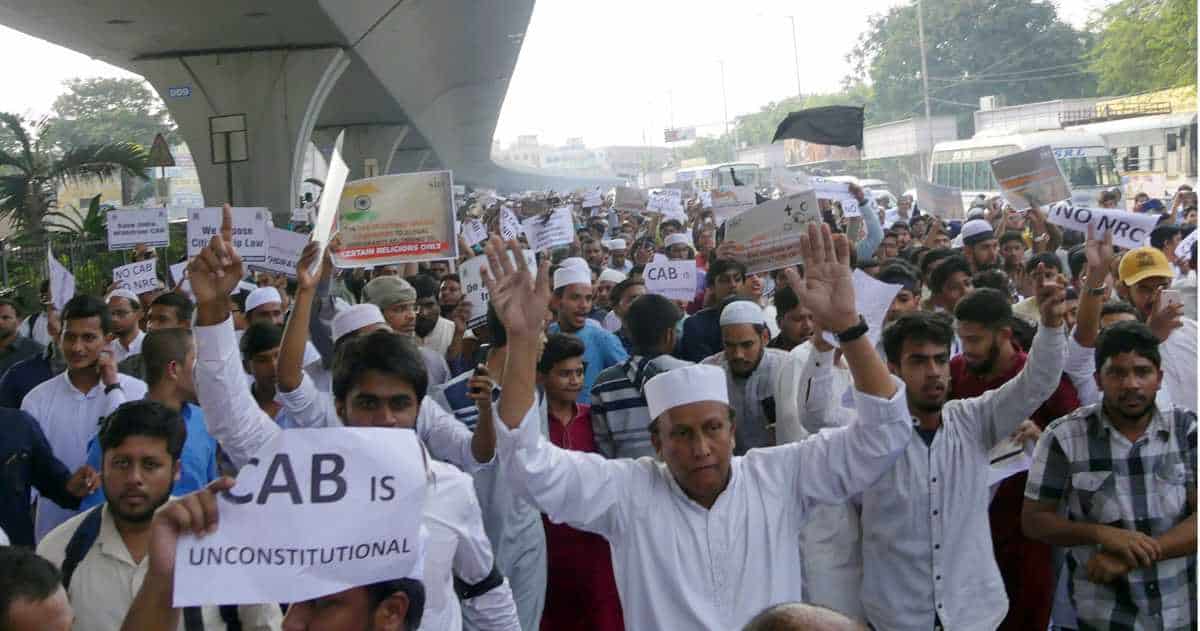P Chidambaram
Project Hindu Rashtra is gaining speed. The engine is the Prime Minister, Mr Narendra Modi; at the wheel is the Home Minister, Mr Amit Shah. The designer/engineer, the RSS, is watching with great interest.
Blunt Message to Muslims
The only surprise is that the BJP is pushing its agenda so quickly after its massive election victory: criminalization of triple talaq, the National Register of Citizens (NRC) exercise in Assam, the repeal of Article 370 of the Constitution and, now, the passage of the Citizenship (Amendment) Bill are part of an elaborate plan to advance Project Hindu Rashtra.
The common intent behind these moves is to send a blunt and unambiguous message to the Muslims of India that they are not equal citizens of this country and to reiterate the Golwalkar-Savarkar theory of ‘India is a Hindu nation’.
The Citizenship Act, 1955 recognizes citizenship by birth; citizenship by descent; citizenship by registration; citizenship by naturalisation; and citizenship by incorporation of territory. All other persons living in India would be ‘illegal migrants’. The Foreigners Act, 1946 and the Passport (Entry into India) Act, 1920 would apply to them and they are liable to be expelled. The religion of a person — whether a citizen or an illegal migrant’ — was alien to the concept of Indian citizenship.
All the above have changed with the passage of the Citizenship (Amendment) Bill, 2019. The Bill is suspect. In fact, many scholars and former judges have opined that it is unconstitutional.
Many Questions, No Answers
What does the Bill do? It picks three countries — Afghanistan, Bangladesh and Pakistan. It picks six ‘minority communities’ — Hindus, Sikhs, Buddhists, Jains, Parsis and Christians. It presumes that any person belonging to one of the six communities from one of the three countries who had entered India on or before December 31, 2014 was ‘persecuted’ in his/her home country and could, therefore, by an executive order, be exempted from the provisions of the Foreigners Act and the Passport (Entry into India) Act. Such a person shall not be an ‘illegal migrant’.
In short, the Amendment Bill has introduced a new route to acquire citizenship — citizenship by executive fiat.
Several questions arise, they were asked, but the government had no answers:
1. Why were only three countries picked for special treatment leaving out other neighbouring countries such as Sri Lanka, Myanmar, Bhutan and Nepal?
2. Why were only six minority communities picked for special treatment leaving out other communities — discriminated in the home-country because they did not belong to the majority — such as as Ahmadiyyas, Hazaras, Balochis, Rohingyas, Jews etc.?
3. Abrahamic religions are three: why was Christianity alone included leaving out Judaism and Islam?
4. Why were Hindus included, but Sri Lankan-Hindus excluded? Why were Christians included, but Bhutanese-Christians excluded?
5. The premise of the Bill is religious persecution. What about victims of other forms of persecution like linguistic, political, cultural, casteist etc.? What about victims of civil wars?
6. Why is the cut-off date December 31, 2014? What is its impact on the cut-off date of March 25, 1971 mentioned in the Assam Accord? Has the latter been discarded?
7. What Is the purpose of exempting from the provisions of the Amended Act the “tribal area of Assam, Meghalaya, Mizoram or Tripura as included in the Sixth Schedule to the Constitution and the area covered under ‘The Inner Line’ notified under the Bengal Eastern Frontier Regulation, 1873”? What are the consequences of such exemption?
8. Are not CAB and NRC Siamese twins? Which will be implemented first, CAB or NRC?
9. Will those who claimed they were born in India or entered India before March 25, 1971 have to change their story now and claim that they were victims of religious persecution in their home-country? Which claim will be a lie and which claim will be truthful?
Consequences of Excluding Muslims
If both CAB and NRC will be implemented, the non-Muslims excluded under NRC will be included under CAB. The net result will be that only Muslims will be identified as illegal migrants and excluded. The consequences will be monstrous.
Once excluded, the government must sequester the excluded persons in camps until any country or countries agreed to accept them. Where will be the camps be built and how many will be required? Will the ‘illegal immigrants’ remain in the camps for the remainder of their lives? And what will be the status of their children?
Besides, there will be social, economic and political consequences, in India and abroad, of incarcerating, indefinitely, millions of Muslims in virtual concentration camps. Reacting to the cleansing in India, there will be pressure on Hindus living in Sri Lanka, Myanmar and Pakistan to emigrate to India.
It was apparent that the government had not taken a considered view on the constitutional validity of CAB when tested on the anvil of Articles 14 and 21 of the Constitution and the Universal Declaration of Human Rights.
Violent protests have broken out in Assam and the North-Eastern states. Large sections of the people across the country, the majority of whom are Hindu, have joined the protest.
Despite the serious questions about the CAB and the turmoil all around, Parliament collaborated with the Executive in passing an unconstitutional Bill. The task of restoring equality and constitutional morality will now fall on the Judiciary.

